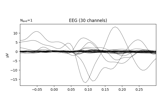mne.decoding.UnsupervisedSpatialFilter#
- class mne.decoding.UnsupervisedSpatialFilter(estimator, average=False)[source]#
Use unsupervised spatial filtering across time and samples.
- Parameters:
- estimatorinstance of
sklearn.base.BaseEstimator Estimator using some decomposition algorithm.
- averagebool, default
False If True, the estimator is fitted on the average across samples (e.g. epochs).
- estimatorinstance of
Methods
fit(X[, y])Fit the spatial filters.
fit_transform(X[, y])Transform the data to its filtered components after fitting.
get_params([deep])Get parameters for this estimator.
Inverse transform the data to its original space.
set_params(**params)Set the parameters of this estimator.
transform(X)Transform the data to its spatial filters.
- fit(X, y=None)[source]#
Fit the spatial filters.
- Parameters:
- Returns:
- selfinstance of
UnsupervisedSpatialFilter Return the modified instance.
- selfinstance of
- fit_transform(X, y=None)[source]#
Transform the data to its filtered components after fitting.
- Parameters:
- Returns:
- X
array, shape (n_epochs, n_channels, n_times) The transformed data.
- X
Examples using
fit_transform:
Analysis of evoked response using ICA and PCA reduction techniques
Analysis of evoked response using ICA and PCA reduction techniques
- set_params(**params)[source]#
Set the parameters of this estimator.
The method works on simple estimators as well as on nested objects (such as pipelines). The latter have parameters of the form
<component>__<parameter>so that it’s possible to update each component of a nested object.- Parameters:
- **params
dict Parameters.
- **params
- Returns:
- instinstance
The object.
Examples using mne.decoding.UnsupervisedSpatialFilter#

Analysis of evoked response using ICA and PCA reduction techniques